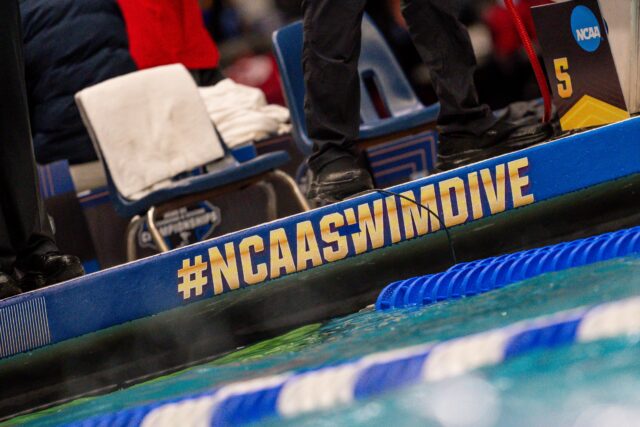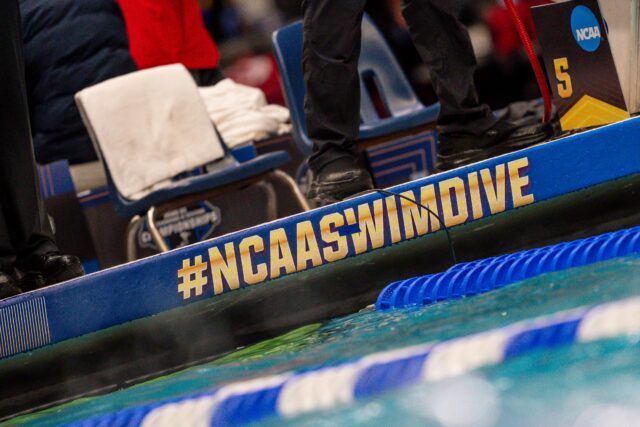By Sophie Kaufman on SwimSwam

In our first edition of this season’s college swimming digest, we joked about how the season was well underway without the NCAA releasing the time standards for the 2026 NCAA DI Swimming and Diving Championships.
Well, folks, those time standards finally dropped this week. But that was far from the only thing the NCAA did. Some weeks, it feels impossible to fit everything that’s happened in the NCAA into an appropriate length digest. That’s typically because a lot of swimmers popped off—a testament to how fast the league has been the past several seasons and how the traditional arc of the college swimming season has been upended. There was a lot of fast swimming this week, which we will certainly get to, but much of this week’s discourse has been dominated by the NCAA’s big announcements.
NCAA Approves Changes to 2026 DI Championships
This week, the NCAA approved the proposed changes to the 2026 NCAA Division I Championships. This comes after the College Swimming and Diving Coaches Association of America (CSCAA) submitted a proposal to the NCAA Sport Oversight Commission in July with numerous changes to the current format. That proposal was originally tabled in August, but has now been pushed through weeks after the season got underway with immediate implications.
Headline Changes:
- No ‘B’ finals—9th through 16th place are now scored directly out of prelims
- New event lineup
- A new qualification model that will give event winners at conference championships automatic qualification to the NCAA Championships as long as they are under the ‘A’ time standard
- Diving finals split into three segments, award ceremonies moved out of the session
These changes are the NCAA’s attempt to modernize the NCAA swimming and diving scene as well as create a more easily digestible primetime broadcast. According to the report, the changes “are strategically designed to elevate the championship’s linear broadcast potential without negatively impacting student-athletes” and that “marquee events will now anchor the final days of competition.” Central to the changes is the idea that every time athletes dive in, there should be a national title on the line.
Related:
- New NCAA Qualifying System: 20 Male, 14 More Female Mid-Major Swimmers Would’ve Made 2025 NCAA Championships
- Power Four Schools Reportedly Opposed to New NCAA Championship Format
- Top Female NCAA Stars All Impacted By New NCAA Event Order
As if that wasn’t enough change for the week, on Wednesday the NCAA Division I Administrative Committee has also officially adopted a proposal that would allow student athletes and athletic department staff to bet on professional sports.
More Details About CSCAA Dual Meet Challenge Revealed, Kyle Sockwell To Commentate
Let’s just keep the administrative news rolling. Last spring, the CSCAA Dual Meet Challenge was announced. It features a bracket-style format based on the November CSCAA Top 25 Dual Meet Poll, and was one of a few of these bracket-style meets—one of the latest efforts to reimagine the NCAA format—announced around that time.
This week, the CSCAA announced that Kyle Sockwell will be the in-house commentator for the competition, which runs November 21-23 at the University of Tennessee. Sockwell has been one of the biggest names leading the charge to make college dual meets more exciting and accessible.
The meet will feature the hosting Volunteers as well as the Arizona State Sun Devils, Michigan Wolverines, and Virginia Cavaliers, meaning each power conference will have one representative. The #1 seed and the #4 seed will compete and the #2 and #3 seeds will race on the first day of competition. From there, the two winners will square off to kick off Day 2, and the two teams that lost will also go to battle. Then the loser of the winner-only meet will face the winner of the loser-only meet, and then on Day 3, there will be a championship dual meet along with a 3rd-place meet. Read more about the format, scoring, and event schedule here.

Photo: CSCAA
In Other News, Swimmers Went Fast This Week
Ok, let’s get back to the pool
First off, the Kennedi Dobson train is rolling for Georgia. At the Dawgs dual meet against the South Carolina Gamecocks, the freshman Dobson dropped a lifetime best 1:43.40 in the 200 freestyle. It’s her first time cracking the 1:44 barrier as she improved on the 1:44.07 she swam at the 2024 U.S. Open. Dobson also swam lifetime bests in the 500 (4:36.22) and 1000 freestyle (9:29.94).
Despite Dobson’s three wins, it was the Gamecock women who came out on top, 157 to 141, beating the Dawgs for the first time since 1985. South Carolina’s divers were key to the victory as they swept the podium on 3-meter and went 1-2-4 on the 1-meter board. South Carolina also won all three 200s of stroke with NCAA finalist Amy Riordan winning the 200 backstroke (1:53.95), Jordan Agliano winning the 200 fly (1:56.68), and Delaney Franklin taking the 200 breaststroke (2:10.81). The Georgia men were without Luca Urlando but still took the win.
We mentioned both swimmers last week, but Ilya Kharun and Bryn Greenwaldt continue to impress early this season. Kharun shined bright at the Sun Devils home meet against UNLV in front of a record-breaking crowd at the Mona Plummer Aquatic Center. Earlier this season he showcased his early-season sprint butterfly speed. He kept that up with a pool-record 43.91 100 butterfly at the meet and an 18.91 50 butterfly split that clocks in as 5th fastest in history. At this meet, he also flexed his 200 butterfly skills, ripping a 1:37.94 200 butterfly, which is the 8th fastest 200-yard butterfly swim in event history.
Kharun now holds the 7th and 8th fastest times on the top 10 list, as the effort was just a hundredth off the lifetime best 1:37.93 he posted at a 2024 dual meet.
View this post on Instagram
Transfer Adam Chaney also put together a top 10 swim as he opened the Sun Devils’ 200 medley relay with a 20.20 50 backstroke. This ties Ryan Murphy for the 5th fastest 50 backstroke lead-off all-time and is .01 seconds off his lifetime best, a 20.19 from the 2022 NCAA Championships. That meet rewrote the 50 backstroke top 10 as Bjorn Seeliger (20.08), Kacper Stokowski (20.16), and Chaney (20.19) all put together historic swims. In 2024, Aiden Hayes took over the top mark with a 20.07. Chaney is the only one of those four still swimming in the NCAA—is this the year we finally see someone crack the elusive 20-second barrier?
Meanwhile, Greenwaldt keeps posting fast 50-yard freestyle splits in her first season in Charlottesville. She split 21.32 at UVA’s intrasquad meet, which also saw Thomas Heilman break three meet records in a schedule that mostly featured off-distance races. This was Virgina’s second meet that mostly had off-distance events, but the Cavaliers will dive into the traditional dual meet format this weekend against Florida. Virginia will be Florida’s second top-10 opponent of the season as they previously took on the Indiana Hoosiers.
Omaha’s freshman diver Nathan Frette has also made a big impression early in his collegiate career. Frette took over the school’s one-meter diving record during Omaha’s season opener against South Dakota State. He surpassed his mark at the team’s next meet against Rockhurst with a 356.90, then broke the school’s three-meter record with a 357.35. Both scores are NCAA Zone Qualifying scores, as was fellow freshman Owen Kipp’s 339.95 effort on the three-meter board.
Read the full story on SwimSwam: 2025-26 NCAA Digest: NCAA’s Changes To 2026 DI Championships Dominate The Week


